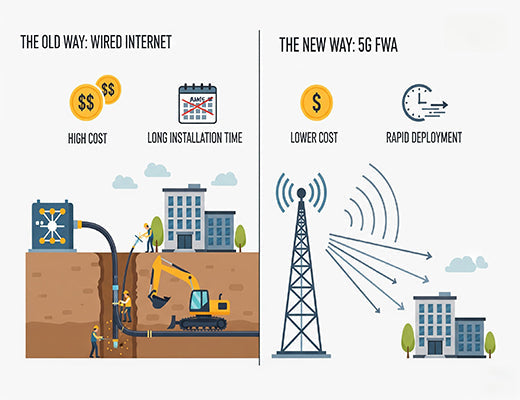
What is 5G FWA? A Guide to Fiber-Speed Internet, Without the Wires
|
|
Time to read 5 min
|
|
Time to read 5 min
What is 5G FWA? In short, 5G FWA (Fixed Wireless Access) is a revolutionary technology that uses the power of 5G cellular networks to deliver ultra-fast, reliable, fiber-like broadband internet to a fixed location, like a home or business, without any physical cables.It works by using a specialized 5G router, known as a CPE (Customer Premises Equipment), to receive the signal and create a local Wi-Fi and Ethernet network, offering a powerful alternative to traditional fiber or DSL.
5G FWA provides a wireless solution to the "last-mile" internet problem, delivering high-speed broadband without the need for costly and slow-to-install physical cables.
The key benefits are massive speeds (often exceeding 1 Gbps), low latency, rapid deployment, and cost-effectiveness, especially in areas where fiber is unavailable.
A specialized Industrial 5G Router is the essential CPE for professional FWA, providing the reliability, security, and advanced features needed for business-critical applications.
5G FWA is a game-changer for rural broadband, primary business internet, and as a high-performance WAN failover solution.
I've lost count of the number of business owners I've spoken to who share the same story of frustration. They're located just outside a major fiber provider's service area, and their only options for internet are slow, unreliable DSL or a satellite connection with crippling latency. They're trying to run a modern, cloud-based business over a digital dirt road.
For decades, the "last mile" of internet connectivity—getting the connection from the mainline to the actual building—has been the biggest bottleneck. Trenching fiber is incredibly expensive and slow.
Let's be clear: that era is over. A powerful new technology is cutting the cord for good. So, what is 5G FWA ? It's your ticket to fiber-like speeds, delivered through the air. It’s the end of waiting for the cable company.

Fixed Wireless Access (FWA) as a concept isn't new. For years, companies have used 4G LTE to provide internet service. It was a good solution, but it had its limits, often topping out at speeds that couldn't truly replace a wired connection.
5G changes everything. It elevates FWA from a "good enough" backup to a true, high-performance primary internet solution. Here's how:
The magic of 5G FWA happens in a single, crucial piece of hardware at your location: the CPE. For all intents and purposes, the 5G CPE is a powerful 5G router .
Its job is to:
While basic consumer-grade 5G CPEs are available, a professional or industrial application demands a more robust device. The real 'aha!' moment for businesses is when they realize an Industrial 5G Router offers the reliability and security features that consumer devices lack, such as advanced firewalls, a full suite of VPNs, and dual SIM failover for multi-carrier redundancy.

This is the primary driver for 5G FWA. For the millions of homes and businesses located outside of fiber deployment zones, it's not just an alternative; it's a lifeline to the modern digital economy. It provides true high-speed internet where the only previous options were slow DSL or laggy satellite.
As we covered in our Guide to WAN Failover , using cellular as a backup is a smart business continuity strategy. Using 5G FWA as your backup is a high-performance strategy. If your primary fiber line fails, your business can failover to a 5G connection that is fast and responsive enough to run your entire operation without compromise.

So, what is 5G FWA ? It's the technology that finally breaks the monopoly of physical cables. It's the democratization of high-speed internet, bringing fiber-like performance to locations that have been left behind.
For businesses and homes, it represents a new era of choice, speed, and flexibility. By combining the power of the 5G network with a professional, secure 5G CPE router, you can build a primary or backup internet solution that is not only fast but also fundamentally reliable.
A1: It can be extremely reliable. While a physical fiber cut is a major source of outages for wired internet, FWA is immune to this. The reliability of FWA depends on the quality of the cellular signal. Using an industrial-grade CPE with high-quality external antennas and the ability to failover between carriers (dual SIM) can provide exceptional uptime.
A2: Yes, typically you will get a specific 5G FWA or "business internet" data plan from a mobile carrier like T-Mobile, Verizon, or AT&T. These plans are designed for high data usage and are often very competitive with wired broadband plans.
A3: The main difference is the hardware and intended use. A mobile hotspot is a small, battery-powered device designed for temporary use with a few devices. A 5G FWA CPE is a powerful, mains-powered router designed for permanent installation, providing a robust network for an entire home or office with more features, better Wi-Fi range, and higher reliability.